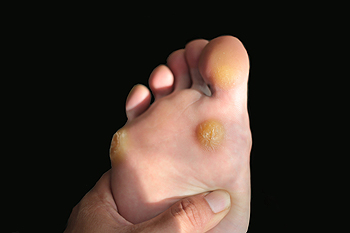6650 Frankford Ave
Philadelphia, PA 19135
 Corns are classified into two groups that are referred to as hard or soft corns. A hard corn typically develops on top of the toes, or on the sole of the foot, and soft corns are often found in between the toes. Both types of corn can occur if there is increased friction from wearing shoes that do not fit correctly. This small area of hardened skin may cause severe pain and discomfort. Relief may be found when the affected area is soaked in warm water. Some patients also find it helpful to use a pumice stone to file away the dead skin, in addition to wearing a corn pad between the toes. If you have a corn that is interfering with your daily activities, it is suggested that you consult with a podiatrist who can offer you correct treatment options.
Corns are classified into two groups that are referred to as hard or soft corns. A hard corn typically develops on top of the toes, or on the sole of the foot, and soft corns are often found in between the toes. Both types of corn can occur if there is increased friction from wearing shoes that do not fit correctly. This small area of hardened skin may cause severe pain and discomfort. Relief may be found when the affected area is soaked in warm water. Some patients also find it helpful to use a pumice stone to file away the dead skin, in addition to wearing a corn pad between the toes. If you have a corn that is interfering with your daily activities, it is suggested that you consult with a podiatrist who can offer you correct treatment options.
Corns can make walking very painful and should be treated immediately. If you have questions regarding your feet and ankles, contact John M. Fanelly, DPM of Northeast Philadelphia. Our doctor will treat your foot and ankle needs.
Corns: What Are They? And How Do You Get Rid of Them?
Corns are thickened areas on the skin that can become painful. They are caused by excessive pressure and friction on the skin. Corns press into the deeper layers of the skin and are usually round in shape.
Ways to Prevent Corns
There are many ways to get rid of painful corns such as:
Treating Corns
Although most corns slowly disappear when the friction or pressure stops, this isn’t always the case. Consult with your podiatrist to determine the best treatment option for your case of corns.
If you have any questions please feel free to contact our office located in Philadelphia, PA . We offer the newest diagnostic and treatment technologies for all your foot and ankle needs.